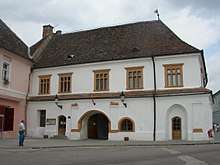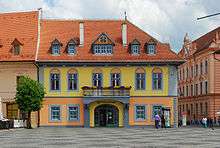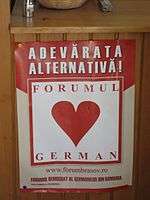Democratic Forum of Germans in Romania
The Democratic Forum of Germans in Romania (German: Demokratisches Forum der Deutschen in Rumänien, DFDR; Romanian: Forumul Democrat al Germanilor din România, FDGR; in short Forumul German or Der Forum) is a centrist political party (legally recognized as an association of public utility) representing the interests of the German minority in Romania.[2]
Democratic Forum of Germans in Romania Forumul Democrat al Germanilor din România Demokratisches Forum der Deutschen in Rumänien | |
|---|---|
| President | Paul-Jürgen Porr |
| Chamber leader | Ovidiu Victor Ganț |
| Founded | 1989 |
| Ideology | German minority interests |
| International affiliation | Federal Union of European Nationalities[1] |
| European Parliament group | Briefly EPP-ED (January–November, 2007) |
| Colours | Red |
| Seats in the Senate | 0 / 136 |
| Seats in the Chamber | 1 / 329 |
| Seats in the European Parliament | 0 / 32 |
| Website | |
| www | |
The forum was founded at the end of 1989, in the wake of the Romanian Revolution.[3] Despite originally being a German minority party, it gradually grew quite popular amongst many ethnic Romanians, especially in parts of Transylvania and Banat, including, most notably, the major city of Sibiu (German: Hermannstadt), where the party still holds a majority in the local city council (12 out of 23 seats), as well as in the County of Sibiu. Aside from Transylvania and Banat, the FDGR/DFDR is also active in Bukovina (i.e. Suceava County) as well, yet mostly without elected representatives in the regional politics.
In terms of reputation, the party is regarded as independent, whilst its politicians, including former Sibiu mayor, former party leader, and current President of Romania, Klaus Johannis, have earned respect as thorough administrators.[4] The FDGR/DFDR has often cooperated with the National Liberals, to which Johannis became a member and one of its prime leaders starting from February, 2013. Additionally, the FDGR/DFDR also has a youth wing known as the German Youth Federation in Romania, currently headed by Adelheid Simon.[5]
At local administration level, most notably in Timișoara (German: Temeschburg) or Baia Mare (German: Frauenbach), the FDGR/DFDR has also co-operated with another Romanian centre-right historical party, namely the PNȚ-CD.
Overview and organization

The history of the German minority in Romania, and more specifically, their presence in the historical region of Transylvania, spans approximately a millennium. Under the blanket term 'Romanian Germans' (German: Rumäniendeutsche) a wide variety of different regional German-speaking groups are included as follows:
- Transylvanian Saxons;
- Banat Swabians;
- Sathmar Swabians;
- Bukovina Germans;
- Transylvanian Landler;
- Zipser Germans;
- Regat Germans [note 1];
- Dobrujan Germans;
- Bessarabia Germans (former Romanian citizens between 1918 and 1940).
Since the year 2000, the FDGR/DFDR has won offices on both local and regional levels. In Sibiu (German: Hermannstadt), the FDGR/DFDR's Klaus Johannis has held the office of mayor from 2000 to 2014. In 2004, the forum gained 60.43% of votes in local elections for the Municipal Council. In addition, the FDGR/DFDR held 12 out of 23 seats in the Sibiu Municipal Council, forming an absolute majority alongside the PNL.
Following the 2016 local elections in Sibiu County (which has a population of about 450,000 residents), the FDGR/DFDR won 8 out of 33 seats in the County Council, where it is the third strongest political faction, after National Liberals and Social Democrats.
The FDGR/DFDR has also had mayors in office since 2004 in the cities of Mediaş (German: Mediasch) and Cisnădie (German: Heltau), as well as in a few villages in Satu Mare (German: Sathmar) county. The FDGR/DFDR is an associated member of the Federal Union of European Nationalities and was formerly affiliated with the European People's Party (German: Europäische Volkspartei).
The FDGR/DFDR is organized in five distinct branches as follows: FDGR Banat, FDGR Bucovina, FDGR Transilvania, FDGR Transilvania de Nord, and FDGR Regiunea Extra-carpatică.[7][8]
Presidents
- 1990–1992: Thomas Nägler
- 1992–1998: Paul Philippi
- 1998–2001: Eberhard Wolfgang Wittstock
- 2001–2013: Klaus Werner Johannis
- 2013–present: Paul-Jürgen Porr[9][10]
Chronology of FDGR/DFDR deputies
- 1990–1992: Ingmar Brandsch
- 1992–1996: Eberhard Wolfgang Wittstock
- 1996–1997: Werner Horst Brück
- 1997–2004: Eberhard Wolfgang Wittstock
- 2004–present: Ovidiu Victor Ganț[11][12]
Localities with FDGR/DFDR mayors
After the 2016 Romanian local elections, the FDGR/DFDR candidates won the following localities:[13]
- Cămin (German: Kalmandi), Imre Sütő
- Sanislău (German: Stanislau), Ioan-Zoltan Kardosi
- Turulung (German: Turterebesch), Gheorghe-Nicolae Gyákon
- Petreşti (German: Petrifeld), Iosif Mellau
- Sibiu (German: Hermannstadt), Astrid Fodor
Furthermore, the FDGR/DFDR holds 91 local councillor seats in 32 communes.[14]
Notable FDGR/DFDR politicians
- Astrid Fodor, the current mayor of Sibiu (German: Hermannstadt)[15]
- Wilhelm Fabini, sculptor and artist
- Martin Bottesch, President of the Sibiu County Council
- Ovidiu Victor Ganț, member of Parliament and MEP for Romania (2007–09)
- Daniel Thellmann, former mayor of Mediaș (German: Mediasch) and founding member of DFDR/FDGR
- Klaus Johannis, 5th President of Romania
- Paul Philippi, theologian and President of FDGR/DFDR
- Eberhard Wolfgang Wittstock, journalist and former FDGR/DFDR Member of Parliament
- Arnold Günter Klingeis, former mayor of Avrig (German: Freck)
- Josef-Otto Exner, president of the ACI Bucovina Foundation in the city of Suceava (German: Suczawa)[16]
- Trudi Wiski, local president for FDGR Cârlibaba (German: Mariensee)
- Josef Robert Stadler, local president for FDGR Frasin (German: Frassin)
- Siegfried Kwirsfeld, local president for FDGR Vatra Dornei (German: Dorna-Watra)
Electoral performance
| Election | Chamber of Deputies | Senate | ||||
|---|---|---|---|---|---|---|
| Votes | % | Seats | Votes | % | Seats | |
| 1990 | 38,768 | 0.28 | 1 | 19,105 | 0.14 | 0 |
| 1992 | 34,685 | 0.32 | 1 | N/A | N/A | N/A |
| 1996 | 23,888 | 0.20 | 1 | N/A | N/A | N/A |
| 2000 | 40,844 | 0.31 | 1 | N/A | N/A | N/A |
| 2004 | 36,166 | 0.35 | 1 | N/A | N/A | N/A |
| 2008 | 23,190 | 0.30 | 1 | N/A | N/A | N/A |
| 2012 | 39,175 | 0.53 | 1 | N/A | N/A | N/A |
| 2016 | 12,375 | 0.18 | 1 | N/A | N/A | N/A |
| 2020 | TBD | TBD | TBD | TBD | TBD | TBD |
See also
- Romanian ethnic minority parties
- Step by step (Romanian: Pas cu pas, German: Schritt für Schritt, ISBN 978-6065887565), autobiographical volume by Klaus Johannis and bestseller in the history of Gaudeamus International Book and Education Fair[17]
Notes
- The term Regat refers to the territorial extent of the Romanian kingdom before World War I.
References
- Liste der Mitgliedsorganisationen, FUEN - Federal Union of European Nationalities
- Markus Nowak. "Minderheit mit Brückenfunktion". Deutsches Kulturforum östliches Europa (in German). Retrieved 23 June 2020.
- Gidó Attila (2012). "Cronologia minorităţilor naţionale din România. Vol. I Albanezi, armeni, bulgari, croaţi, eleni, evrei şi germani". Editura Institutului pentru Studierea Problemelor Minorităţilor Naţionale (in Romanian). Cluj-Napoca. p. 303.
- Andreea Zamfira (2009). "Les minorités nationales allemandes et hongroises dans le mental collectif des Roumains: une incursion dans l'imaginaire pour mieux comprendre la société et le politique". Rusca (in French). Retrieved 24 May 2015.
- Federația Tineretului German din România (FTGR), 7 June 2020, FDGR.ro.
- "Casa Lutsch". Forumul German Sibiu (in Romanian). Retrieved 29 May 2020.
- "FDGR-Regiunea Extracarpatică". Retrieved 23 June 2020.
- "Struktur des DFDR". FDGR.ro (in German). Retrieved 23 June 2020.
- Doctorul Paul Jürgen Porr, succesorul lui Klaus Iohannis la conducerea Forumului Democrat al Germanilor din România, 5 March 2013, Gândul
- Medicul Paul Porr este noul președinte al FDGR, 10 July 2013, Mediafax
- Aleşii Votează: Pagina deputatului: Ganț Ovidiu Victor Archived 2012-10-06 at the Wayback Machine
- ADZ: Ovidiu Ganţ resümiert zehn Jahre Politik - Der Abgeordnete stellt in Bukarest sein Buch vor, 22 September 2011
- Forumul Democrat al Germanilor din România. "Rezultatele FDGR în alegerile locale din 2016". FDGR/DFDR website (in Romanian). Retrieved April 22, 2020.
- "Lista competitorilor care au obținut mandate" (XLSX). 2016bec.ro (in Romanian).
- Astrid Fodor aleasă cu 57,13%, 6 June 2016, Ora de Sibiu.
- Forumul regional Bucovina, 7 June 2020, FDGR.ro.
- Anca Simionescu (24 November 2014). "Cartea lui Klaus Iohannis, bestseller absolut în istoria Gaudeamus". Evenimentul Zilei (in Romanian).
External links
- Romanian Chamber of Deputies
- (in German) Hermannstädter Zeitung
- (in Romanian) Romanian Department of Internal Affairs (some information in English)
- (in German) Allgemeine Deutsche Zeitung für Rumänien
- (in German) Verband der Siebenbürger Sachsen in Deutschland
- (in German) Deutsches Forum der Banater Berglanddeutschen
- (in German) Deutsches Forum Kronstadt
- (in German) Deutsches Forum Sathmar
- (in German) Deutsches Forum Bistritz
- (in German) Deutsches Forum Klausenburg
- (in German) Deutsches Forum Schäßburg

